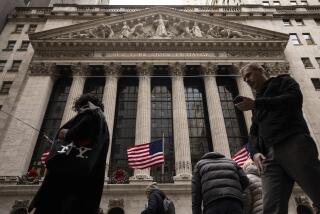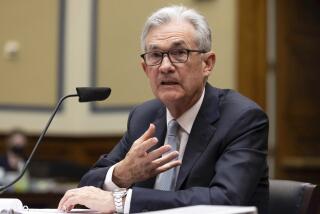Growth to Drag Its Heels, Economists Predict : Forecast: Defeat of Clinton’s stimulus package causes National Assn. of Business Economists to lower expectations on jobs, interest rates.
- Share via
WASHINGTON — The economic recovery will proceed at a sluggish pace through the end of 1994, keeping inflation in check and opening the door to additional interest rate reductions, a group of leading private sector economists predicted Wednesday.
The defeat of President Clinton’s stimulus package and growing skepticism about his deficit-reduction plan suggest that economic growth will not exceed 2.8% to 3% and job creation will remain modest, according to the National Assn. of Business Economists.
In its quarterly assessment of economic conditions, the group said it revised downward its growth forecast in 1993 from 3.1% to 2.8% following a government report that the economy grew at an annual rate of only 1.8% during the first quarter.
“The first quarter was substantially below our forecasts, but for the year there are only very modest changes,” said Joseph W. Duncan, president of the association. “The lower forecast can be explained in part by the loss of the stimulus package.”
Revising their earlier forecasts, the association predicted that interest rates will fall in the months ahead as the slow-paced recovery opens the door to additional easing by the Federal Reserve Board and reassures the bond market that inflation will remain moderate.
The economists had predicted in their last report that yields on 90-day Treasury bills would rise to 3.9% by March, 1994, but their estimate was revised down to 3.5%, a relatively modest gain from the current level of 3.1%.
More significantly, they predicted that the rate on 30-year government bonds would decline through the end of this year and rebound in early 1994 to its current rate of 7.0%. The group’s previous survey had estimated that long-term rates would rise to 7.7% by next year.
The economists also broke away from a growing sentiment in the financial community that inflation will return, predicting that it will remain in check at 3.2% for the remainder of 1993 and 3.4% for 1994.
Fueled by government reports of unexpectedly high increases in both the consumer and producer price indexes in April, the markets have expressed serious concern about inflation.
The lower-than-expected interest rates and steady inflation will do little to help the economy, the analysts said, affecting only “interest-sensitive” spending, such as auto sales and housing starts.
The panelists had expected in February that the $16-billion stimulus package--which was subsequently killed by a Republican filibuster in the Senate--combined with the President’s commitment to deficit reduction, would increase growth by about 0.2%.
But the economists now see “a lack of momentum in Washington,” Duncan said, and have mixed opinions about the credibility of the deficit-reduction program. Only one-fifth of those surveyed predicted that the plan would cut the deficit more than $200 billion over five years, and almost an equal number predicted that the deficit would actually remain the same or increase.
“The plan as presented is very much back-loaded. The taxes are up front to reduce personal buying power next year and the savings are from cuts in later years,” said Duncan, who is also vice president and corporate economist for Dun & Bradstreet Corp. “The panel feels this has been happening in Washington for the last 15 years . . . and has to be a little skeptical of Congress making those long-term cuts.”
The unemployment rate should improve slightly, the economists said, averaging 6.9% for this year and dropping to 6.5% in 1994.
More to Read
Get the L.A. Times Politics newsletter
Deeply reported insights into legislation, politics and policy from Sacramento, Washington and beyond. In your inbox twice per week.
You may occasionally receive promotional content from the Los Angeles Times.










